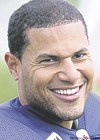Armstrong, Bruce let egos overpower brains
Advertisement
Read this article for free:
or
Already have an account? Log in here »
To continue reading, please subscribe:
Monthly Digital Subscription
$1 per week for 24 weeks*
- Enjoy unlimited reading on winnipegfreepress.com
- Read the E-Edition, our digital replica newspaper
- Access News Break, our award-winning app
- Play interactive puzzles
*Billed as $4.00 plus GST every four weeks. After 24 weeks, price increases to the regular rate of $19.00 plus GST every four weeks. Offer available to new and qualified returning subscribers only. Cancel any time.
Monthly Digital Subscription
$4.75/week*
- Enjoy unlimited reading on winnipegfreepress.com
- Read the E-Edition, our digital replica newspaper
- Access News Break, our award-winning app
- Play interactive puzzles
*Billed as $19 plus GST every four weeks. Cancel any time.
To continue reading, please subscribe:
Add Free Press access to your Brandon Sun subscription for only an additional
$1 for the first 4 weeks*
*Your next subscription payment will increase by $1.00 and you will be charged $16.99 plus GST for four weeks. After four weeks, your payment will increase to $23.99 plus GST every four weeks.
Read unlimited articles for free today:
or
Already have an account? Log in here »
Hey there, time traveller!
This article was published 04/08/2009 (5915 days ago), so information in it may no longer be current.
Less than a third of the way through the season, but having already seen two episodes of Wideouts Gone Wild, I can’t help but wonder at what point in a player’s career does success and talent start to impact decision-making skills.
After several all-star calibre and episode-free seasons in Winnipeg, Derick Armstrong ran afoul of the team in Week One when, yours truly, came down with a last-minute brain infection and the designations of players had to be changed just before kickoff. Informed that he would not be starting in the receiving corps for Winnipeg, but entering the game as one of the designated imports, Derick decided to dress, but withhold his services in protest of his perceived slight. Shortly thereafter, the head coach of the Argonauts, Bart Andrus, reportedly decided to leave Arland Bruce at home for a game in Winnipeg because he was not conducting himself like a professional — being late for meetings, forgetting his playbook, speaking out of turn, on-field theatrics, etc, etc, etc. Arland did not respond well to his in-house suspension, called out his coach and his quarterback, and is now playing football for the much improved Hamilton Tiger-Cats, all over the course of about seven days.
So what, if anything, do these two situations and athletes have in common, and what could possibly have led them to react the way they did to these perceived insults? Had Derick realized he had been injured almost all of camp and was the least practised receiver on the team — though one of the most talented — and swallowed his pride until the second series of the game when he could have hit the field, he would most certainly still be employed in professional football right now, and probably starting for the Winnipeg Blue Bombers.
Imagine if Arland Bruce bit his tongue for a week (for the first time since he played here under the tutelage of Milt Stegall) while his cohorts travelled to Manitoba and won a game without him.
Andrus has come close to admitting that Bruce would have been allowed to rejoin the team upon their return, instead of being shipped down the QEW to the Argos’ most despised rivals.
So did these two superstar receivers actually think they were big enough to get away with these acts of defiance? Or did they simply not possess the wherewithal to anticipate the consequences of their actions? Or worse, did they simply not care? For there are moments in every athlete’s career when you have to know that what you are about to do or say next will impact the rest of your career and future profoundly, and these two both had to know the consequences of their actions would not be favourable.
In Derick’s case, he chose to dress but not play. Regardless of his motivations, he sat there and watched his team lose their season opener while fully geared and prepared to go. He could not have thought that that would go over well, especially after he stood by his decision in the media. With Arland, the minute he chose to respond to his in-house discipline by questioning his coach’s credentials and the play of his starting quarterback, he could not have thought his impudence would be beyond reproach, could he?
Well, after reading Arland’s quote in the Toronto Star in an article penned by Chris Zelkovich — “Muhammad Ali got knocked out, Mike Tyson got knocked out, Damon Allen’s been released and played on several teams, Warren Moon’s played on several teams. Those are Hall of Fame guys and I see myself being a Hall of Famer one day in this league” — plus Armstrong’s comments after the Edmonton game, I honestly think they both feel they were justified in their reactions and that they understand the concept of ‘team’ as well as I understand Paris Hilton’s televised pursuit for a new BFF.
Just because you have an abundance of talent and fans and are tenured on a team, you should not expect your ego to be handled with kid gloves, especially to the point where it is put in front of the well being and solidarity of a team. If you disagree, then you are so far lost in your own self-admiration that your distorted view of proper conduct is understandable.
Doug Brown, always a hard-hitting defensive lineman and frequently a hard-hitting columnist, appears Tuesdays in the Free Press.





